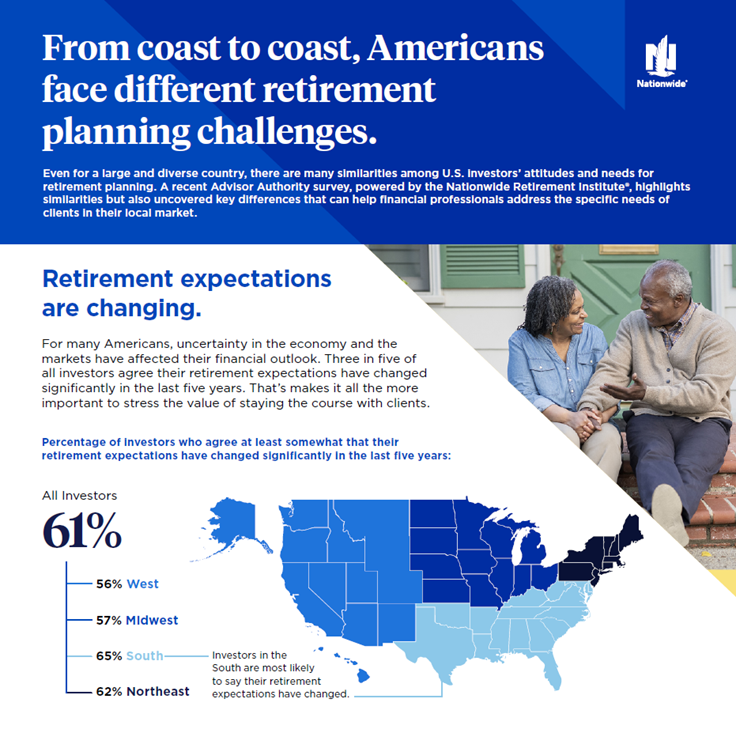Key Takeaways:
- Two-thirds of investors surveyed spend no time on retirement planning, signaling an opportunity for financial professionals to engage in retirement planning discussions.
- Regional differences in retirement planning and financial behaviors surfaced, highlighting the necessity for financial professionals to tailor their approach to clients' localized needs.
02/03/2025 – Americans have experienced significant financial upheaval over the last several years—record inflation, rising interest rates, stock market turbulence and more. While many are experiencing the same challenges, the impact and attitudes of investors vary based on where they live.
We polled investors and financial professionals across the country as part of a recent Advisor Authority survey, powered by the Nationwide Retirement Institute®. We wanted to get a better sense of how Americans in different regions view retirement planning and their financial future. Nationwide Retirement Solutions serves plan sponsors and participants in all corners of our country, so understanding these nuances can help us personalize our approach with these important customers and partners with a one-size-fits-all approach. As a financial professional, personalizing your approach with clients is equally important.
The survey results highlight some positive actions investors have made in the face of economic challenges. For instance, a majority of investors (76%) have taken steps to remain financially resilient in light of economic volatility. Yet, many Americans aren’t as optimistic about their finances and retirement and could use guidance from financial professionals to help them prepare better for the future.
Not spending time planning for retirement
To begin, let’s look at some insights on individual investors from the survey data. One insight that stood out to me was how many people spend no time at all on retirement planning. Among all investors we surveyed, 67% told us they spend zero percent of their time in a typical month planning for retirement. That’s two out of every three investors, which represents a tremendous opportunity for you as a financial professional to have planning discussions with clients on a regular basis.
Let’s break that down further. It’s not surprising that younger investors wouldn’t spend as much time thinking about retirement. But the lack of planning among Millennial (68%) and Gen Z (59%) investors presents a huge opportunity for this group to start putting the power of long-term investing strategies into action.
You would also expect people nearer to retirement to spend more time preparing for it, and our survey does show a higher number of pre-retirees (ages 55-65) (47%) spending at least some time each month on retirement planning. But more than half of investors in this age group (53%) are still spending zero percent of their time a month on their retirement plans.
That number needs to change if we’re going to help more Americans get ready for the financial challenges of retirement. With a huge population of Americans reaching the traditional retirement age of 65 in the next few years, there’s opportunity for you to connect with investors who are at this critical stage of retirement planning and need to spend more time thinking about their financial future. Many investors in this age group are prime candidates to become new clients and can bring more assets under management to your practice.
Effects of economic challenges
For many Americans, the economic stress they have faced over the last five years has affected their outlooks for retirement. Around three in five investors across the country (61%) said that their retirement expectations have changed significantly over the last five years. Additionally, nearly half of all investors (46%) said that because of economic conditions seen in the last five years they’ve had to delay, change or cancel their retirement dreams.

These sentiments are mostly consistent across the country, although they may be stronger in certain regions. For example, investors in the South are more likely to say their retirement expectations have recently changed.
When we dig into the specifics about the economic factors that pose the immediate challenges to investors’ retirement portfolios over the next 12 months, inflation remains the biggest worry, followed by fear of economic recession. Taxes and health care costs were cited by one-quarter of investors. About one in five investors said rising costs of living were forcing them to make withdrawals from their retirement savings.
You can bring more value to your client relationships by focusing on the areas of greatest concern, such as inflation (according to the investors in our survey). Helping clients stay ahead of inflation with a retirement savings plan focused on long-term growth is one way to address these needs.
Highlighting the regional differences
While many insights from this survey were universal for Americans across the country, there were some regional differences in the data that are interesting to highlight. You can use these insights to tailor your approach as you work one-on-one with clients and help them devise financial plans for their personalized needs. This data also can be helpful to plan sponsors and the advisors who serve them as they work to tailor their plans to meet the specific needs of their participants.
For example, in the Northeast the high cost of living is a major concern, especially with clients thinking about how to manage their income in retirement. One in four Northeastern investors (25%) will need to continue working in retirement to supplement their income out of necessity due to cost of living in their area.
Among investors in the Midwest, working longer and delaying retirement isn’t as much of a priority. Just 32% of Midwesterners say they plan to work past age 65—the lowest share in all U.S. regions. Yet, they lead other regions in ignoring retirement planning; over three-fourths (76%) claim to spend no time in a typical month on planning for retirement.
It’s a different story in the South, where around three in five investors (62%) agree that the norm of retiring at age 65 doesn’t apply to people like them. Moreover, 39% of Southerners say they would need to continue working in some capacity to supplement their income out of necessity if they retired in the next 12 months.
Out West, clients are generally well prepared; Western investors indicated the highest median level of savings of all regions, at about $300,000. Yet, the high living costs are a drag on planning with seven in 10 (69%) saying the cost of living will impact their ability to retire.
Stand out in your local market
Results from this survey shed light on many key areas of financial planning where investors are lacking guidance and seeking support from financial professionals. A holistic financial plan has many facets, and your role as a financial professional places you in position to discuss topics that are important to your clients and address any shortcomings in their plans.
Additionally, it's critical to help your clients think about the impact of relocation from a financial and quality of life perspective. For example, an area might look appealing from a tax perspective, but there are other important factors to consider, such as living costs, access to health care and housing market trends.
The regional survey data also underscored differences in the kind of guidance investors are receiving from their financial professionals. In parsing this data, we can see some areas of opportunity for you to gain an advantage in your local market.
Inflation tops the list of their clients’ concerns over the next 12 months that financial professionals are addressing with clients. These concerns were highest in the Northeast and Midwest (36%), followed by the South (34%), and West (29%).
Taxes and retirement savings remain top priorities across all regions. Financial professionals frequently discuss tax strategies (Northeast 33%, Midwest 37%, South 37%, West 33%) and accumulating sufficient savings to enter or stay in retirement (Northeast 27%, Midwest 31%, South 32%, West 33%) with their clients.
Financial professionals are also emphasizing retirement timing and long-term care. They’re focusing on helping clients evaluate when they are financially ready to retire (41% West, 33% Northeast, 37% Midwest, 32% South). Many are also prioritizing long-term care planning with their clients (34% West, 22% Northeast, 21% Midwest, 24% South).
Helping you build trust and grow your practice
Your success as a financial professional comes down to the relationships you foster with clients. The basis for those relationships is trust; clients trust you to understand the different financial challenges they face and to offer guidance that gets them closer to achieving a secure, comfortable retirement.
Before you sit down with clients to help them prepare for their financial future, it’s important that you’re prepared too—with insights and resources that address the many retirement challenges clients face.
At Nationwide, we are available to support the work you do in different ways. Resources from the Nationwide Retirement Institute explain the complexities of retirement planning, helping you meet your clients’ different financial needs. You can count on us to help you close the gaps in your clients’ financial plans and build stronger relationships that help grow your business.


